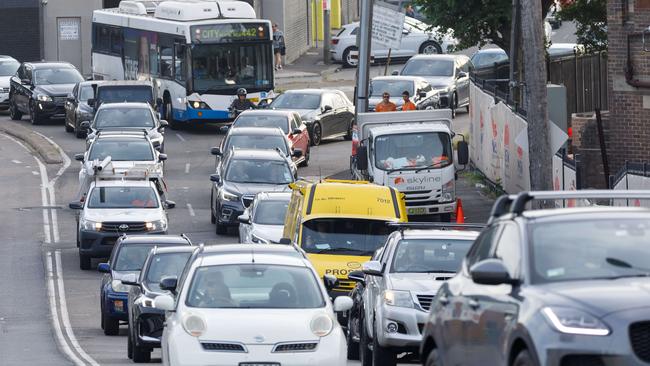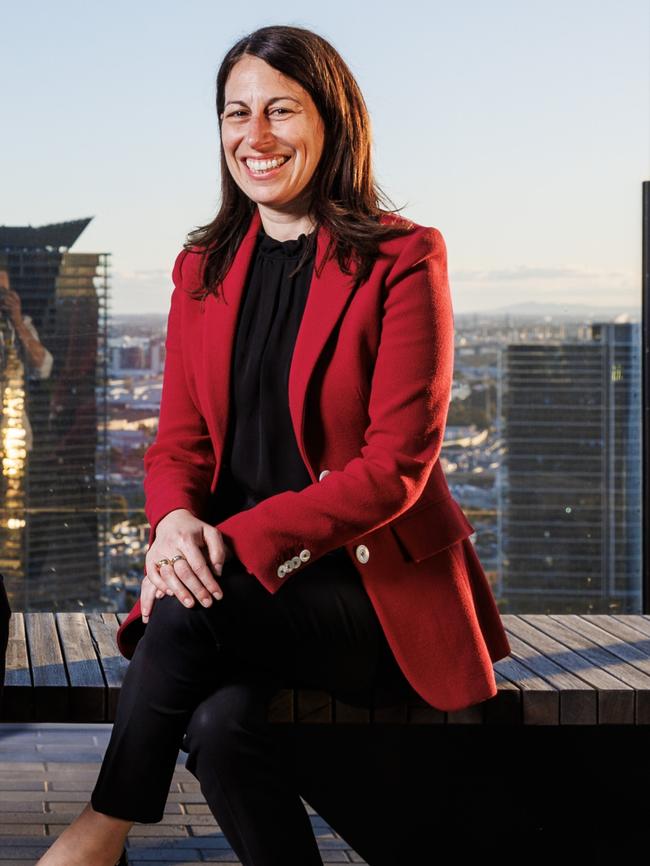Toll road operator Transurban sees profit rise but misses forecasts
CEO Michelle Jablko is in the crosshairs of public opinion over rising tolls and the Rozelle Interchange debacle, while also trying to placate investors underwhelmed by earnings.

Business
Don't miss out on the headlines from Business. Followed categories will be added to My News.
Transurban boss Michelle Jablko has faced mild dissatisfaction from investors at her maiden interim results as she works to balance the needs of a community struggling with cost of living pressures and shareholders underwhelmed by the toll giant’s earnings.
The toll road operator has also been in the spotlight because of disastrous planning – seemingly not of its making – at a new interchange in Sydney’s inner west that has caused traffic chaos on surface roads since it was integrated into WestConnex.
Ms Jablko, best known for her balance sheet nous as the former chief financial officer of Transurban and ANZ before that, said she understood many Australians were struggling to make ends meet as the country reeled following record high inflation.
“I know there are cost of living pressures, and they’re real, and that’s why we’re really focused on the value we’re delivering,” said Ms Jablko, who has been in the CEO role since October.
More than 80 per cent of Transurban’s customers spend $10 per week or less on toll charges, Ms Jablko pointed out, with tolls accounting for less than 1 per cent of household budgets.
It’s critical that Transurban appears to understand the needs of the nation’s motorists, because to do otherwise could reduce its chances of winning future government contracts to operate roads and tunnels.
That has been particularly difficult since the Rozelle Interchange opened to traffic in November 2023, with the snaking traffic jams triggering a NSW upper house inquiry into the planning and implementation of the massive road project, which Ms Jablko said Transurban would contribute to.
“We are absolutely working hard with the government,” to improve conditions for motorists, she said. “There are lots of things being done, with some by us and quite a lot by the government, whether it’s signage communication, trying to improve some of the pinch points by moving where mergers happen.”

The new road project had cut a third of their travel time for motorists coming in from western Sydney, such as Parramatta or Penrith, she said.
“It is delivering a lot of value for those customers, but I get that it’s frustrating” for those in the inner west, she said.
Michael Haynes from Atlas Funds Management said that despite the noise, Ms Jablko was handling the pressure of being a CEO “well” after her experience at ANZ, “where she would have had much higher pressure from external parties”. Mr Haynes said Transurban invested billions of dollars upfront to build and operate these assets in return for income from those who use the roads and that it did not set the tolls it charged.
“Tolls are increased with government-contracted pricing,” said Mr Haynes. “Transurban roads are also a discretionary service; if the fees for the service are too high for users, they can use other roads that are provided for free. Also higher inflation results in higher borrowing costs for Transurban, though due to prudent moves to secure cheap long-term debt several years ago, the full force of increasing interest rates is yet to flow through to earnings.”
First-half traffic numbers at Transurban missed market expectations, but the company reined in costs during the first half to report proportional earnings before depreciation, amortisation and tax of $1.33bn, up 7.5 per cent on the previous period and close to market consensus.
In its statutory results the Melbourne-based firm posted profit of $230m, a 310 per cent increase on the previous period off a 4.5 per cent increase in revenue to $2.12bn and reaffirmed is full year distribution guidance of 62c per share.
Citigroup said the result was likely to disappoint investors. Transurban shares fell 1 per cent or 13c to $13.19.
It does not take much of a miss for Transurban to disappoint the market because it is viewed as a low-risk option compared with other industrials and has consumer-price-linked toll escalations for about 70 per cent of its revenue.
Milford Portfolio Manager Dan Simmonds said the market had been expecting an increase in the distribution guidance based on rising free cash flow. He said the company’s proposed takeover of Melbourne’s EastLink, which was blocked by the Australian Competition & Consumer Commission late last year, now looked unlikely to go ahead.
“EastLink appears to be off the table due to ACCC’s decision,” said Mr Simmonds. “This has tarnished the perception of strategic value embedded in Transurban’s portfolio, which was perhaps valued at $1 per share.”
The competition regulator signalled it did not want Transurban to replicate its stranglehold on Sydney and Brisbane’s road network in yet another state.
Mr Simmonds said that along with the departure of former CEO Scott Charlton, it added “to this perception that strong growth through strategic acquisition is less clear from here”.
Ms Jablko said the US state of Virginia, where Transurban already has an asset, showed the greatest opportunity.
“There will be more opportunities in the US,” Ms Jablko said. “We announced that we’ve entered into development framework agreements with the Department of Transportation in Virginia. There are other parts of North America that strategically could be of interest to us as well.”
More Coverage
Originally published as Toll road operator Transurban sees profit rise but misses forecasts




